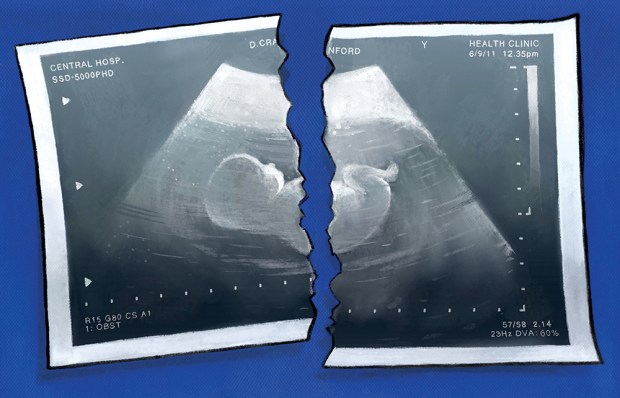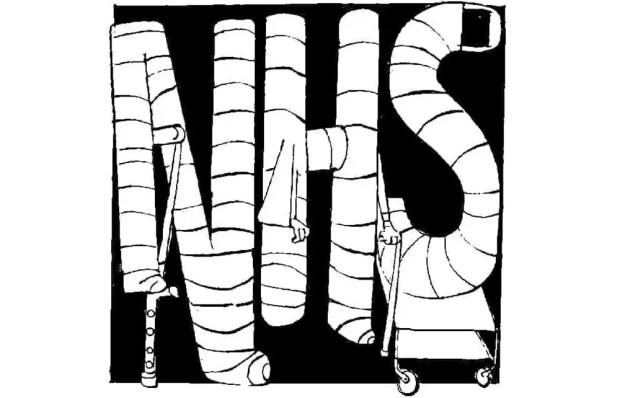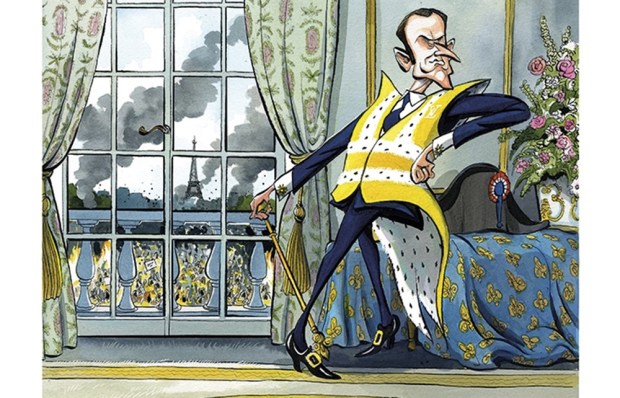Last week there should have been a great victory for the British turbine industry. Auctions were held for offshore wind power, asking companies to bid for the right to supply electricity at £44 per megawatt hour – a third of the price offered eight years ago. The government and the renewables lobby hoped that a successful auction would show that wind power could compete with fossil fuels. Instead, developers worried that they couldn’t turn a profit on the amount they would be paid for energy. There wasn’t a single bid.
‘It was very embarrassing,’ says Gary Smith, leader of the GMB union. ‘Whitehall told us wind was getting cheaper and cheaper. Now there will be no bids for the next round of licences because the wind industry can’t afford to put up the projects.’ The auction flop was humiliating not only for the government but also for Sir Keir Starmer, who has said he wants a net-zero carbon electricity system by 2030, along with no more licences for North Sea oil- and gas-drilling.
Starmer’s 2030 deadline is ‘impossible’, says Smith. ‘I don’t even worry about it. It can-not be done.’ No amount of enthusiasm can overcome these particular hurdles. ‘The National Grid can’t get [undersea] cables. There are four suppliers of cables in the globe, they’re all booked out to 2030.’
GMB is one of the biggest union donors to the Labour party, but when it comes to oil, Smith’s position is closer to the Tories. ‘There will be more drilling in the North Sea,’ he says. ‘What are we going to do? Put up the infrastructure and have nothing to plug in? It’ll look great, but we’ll be watching it in the dark.’
It’s a point you’re unlikely to hear made in the House of Commons. ‘The renewables lobby is very wealthy and powerful,’ says Smith. ‘I think people on the left, for good intentions, have got hoodwinked into a lot of this.’
Smith has been a GMB member for his entire working life. He joined at 16 when he was a gas service engineer in Edinburgh. Since he became general secretary two years ago, he has made it his priority to point out the problems with Westminster’s net-zero targets. He believes the blind rush for a green revolution is harming those who can least afford it: ‘We’ve cut carbon emissions bydecimating working-class communities.’
He describes the green levies that have added £170 a year to every household bill as a modern-day poll tax, ‘disproportionately paid for by the poorest’. ‘The poor pay the same as everybody else. It doesn’t matter if you’re in a leaky, freezing council house. You’re paying basically the same for renewables.’
These kinds of impositions might be tolerated, he says, if there were any sign of the ‘green jobs’ promised by every government since Tony Blair. ‘Communities up and down the east coast can see wind farms,’ says Smith. ‘But they can’t point to the jobs.’ Much of the green work seems to be either London-based lobbying, or clearing away the animal casualties of wind-farm blades: ‘It’s usually a man in a rowing boat, sweeping up the dead birds.’
What’s gone wrong with the green jobs initiative? Smith’s answer is simple – everything is built elsewhere, then imported to the UK. ‘Our energy infrastructure is now built in China, it’s built in Indonesia, it’s built in the Middle East, and, ironically, in sovereign oil and gas wealth-fund backyards.’ It often feels like a betrayal of what’s been promised. ‘We’ve got a wind farm going up ten miles off Fife – it’s been built in Indonesia. We took taxpayers’ money to go to court to overturn a ban on the wind farm, to get [planning] consent… As soon as it’s consented, the project’s sold and the work we’re promised is shipped off to Indonesia.’
Smith castigates the Conservatives for an ‘ideological bent’ towards the kinds of economic systems that lead to the importing of goods and outsourcing of jobs. But he insists the GMB is not a protectionist organisation. ‘I know the history of our union,’ he says. ‘When we introduce protectionism, [there’s an] impact that has on working people and unions – it’s not what we’re about. What we want to see is a fairer trading relationship. And let’s stop talking about this as if market economics is somehow driving it. It’s not. We’ve had a communist state skewing the global economy.’
This brings Smith to his greatest frustration: China and the Tories’ approach to it. ‘The fact that a lot of [imports are] coming from an increasingly authoritarian, non-market economy in China seems to have escaped the economic debate,’ he says. ‘We are hugely dependent on food imports and on energy imports. And we want to be a trading nation, but we’ve become increasingly dependent on places like China because we can’t [secure] our energy future.’
Once again, though, Smith’s criticism is not reserved just for the Tories. ‘We’ve fallen out with the SNP. We’re not the favoured trade union of the Green party. We are very critical of Labour because a party for labour – the clue’s in the name – should be focusing on how we create jobs.’
As an affiliated union, the GMB, with its 500,000 members, is one of most influential in Starmer’s party. Might Smith be able to bring some moderation to Labour’s policies? ‘To be fair, I think Rachel Reeves and Starmer are talking about jobs again,’ he says. He acknowledges that the UK ‘cannot do a Biden’ and pour hundreds of billions of pounds into infrastructure to create jobs: ‘We don’t have a reserve currency. We don’t have deep pockets. We are a small, small trading nation.’ The shadow chancellor came to similar conclusion in June when she dropped Labour’s £28 billion pledge for ‘green investment’.
Does Smith think Labour’s shadow climate change secretary Ed Miliband alsounderstands the tension between net-zero targets and people’s livelihoods? He bursts into laughter. ‘I think Starmer and Reeves are listening,’ he says at last, after regaining his composure. ‘I think the realities Ed Miliband is going to confront will force him to listen to the voices of working people.’
For someone so critical of net zero and Britain’s dependency on Chinese investment, Smith is broadly positive about the future of green energy and sees Hinkley Point as a success story. The nuclear site is one of the largest construction projects in Europe, employing 10,000 workers at its peak. ‘That whole labour force will then move to Sizewell,’ he says. In other words, if you build it, they will come.
Smith is difficult to pigeonhole. He did not support Brexit; indeed, after a poll of GMB members in 2018 (before Smith became general secretary), the union called for a second referendum. ‘If you listen to some voices, Brexit’s been utterly catastrophic,’ he says. ‘I don’t think that’s most people’s experience of it, but it’s definitely impacting jobs and investment.’ On policies such as industrial strategy and government investment, he sticks to his union’s traditional left leanings – many times in our interview he praises Biden’s attempt to ‘shift’ America’s political economy, as well as the importance of ‘solidarity and common endeavour’. Yet he also believes that business must be ‘part of the solution’ if Labour wants to be pragmatic about going green.
‘What worries me about Labour with oil and gas,’ he laments, ‘is that these are going to be the same companies who are going to develop hydrogen. They’re really excited at the prospect of developing floating wind. We’ve got to stop seeing them as the enemy and we’ve got to start seeing them as people who we can work with.’
He says he’d recommend jobs in the trade to just about anyone, from any political background. ‘I said to one of the Tory MPs, if you lose your seat, I’ll see if we can get you a job at Hinkley. You’ll get a pay rise and you’ll be doing something useful and socially productive for once.’
Smith also detects a kind of snobbery in the green agenda. ‘There’s a class dynamic to all this. Too many politicians, too many lobbyists, too many people from the City of London who mix in the same social circles. You’ve got an echo chamber around how virtuous all this stuff actually is.’ His advice to the Just Stop Oil protestors would be to ‘go and protest the energy companies who are exporting renewables work to China’.
As Smith sees it, net zero is ‘fundamentally quite a middle-class environmental debate. They say nice things about jobs and then do nothing about the delivery of jobs.’ That’s why he’s taken such a strong stance on the issue. The GMB, Smith maintains, has been ‘utterly consistent’ on net zero – it’s Britain’s political parties that have ‘all gone mad periodically’.
Got something to add? Join the discussion and comment below.
Get 10 issues for just $10
Subscribe to The Spectator Australia today for the next 10 magazine issues, plus full online access, for just $10.
You might disagree with half of it, but you’ll enjoy reading all of it. Try your first month for free, then just $2 a week for the remainder of your first year.














Comments
Don't miss out
Join the conversation with other Spectator Australia readers. Subscribe to leave a comment.
SUBSCRIBEAlready a subscriber? Log in